As stated in our Environmental Charter, MC recognizes the critical importance of natural capital, including biodiversity, and is committed to maintaining, protecting, and restoring it. We have positioned “Conserving and Effectively Utilizing Natural Capital,” including consideration of biodiversity, as part of our Materiality, which are issues for management to address in order for MC to achieve sustainable growth. Based on these policies and materiality analysis, MC analyzes its nature-related issues using the TNFD framework and strives to minimize negative impacts on its natural capital from its business activities. Natural capital issues are taken into account when reviewing and making decisions on loan and investment proposals.
Forests are regarded as one of the most important types of natural capital because of their vital role in preserving biodiversity as well as capturing and storing greenhouse gases. Therefore, MC is working to reduce the deforestation impact of its activities to zero, including through the establishment of individual guidelines for each of the forest risk commodities we handle (soybean, timber and paper products, and palm oil ) with the aim of ensuring that procurement of these commodities is not connected to deforestaion. To confirm compliance with the Mitsubishi Corporation Policy for Sustainable Supply Chain Management, which outlines MC’s actions to address human rights, labor rights, and environmental issues in the supply chain, we also require all MC suppliers to understand, support and implement this policy. Furthermore, we conduct annual supplier surveys to ensure that our policies regarding the handling of products with high environmental or social risks are being observed. (See the Supply Chain Management page for further information.)
In addition, we are engaged in corporate philanthropy activities aimed at conserving biodiversity, including the Tropical Forest Regeneration Project and the Global Coral Reef Conservation Project.
MC strives to mitigate the impact that its businesses have on biodiversity, and seeks ways to contribute to ecosystem preservation through its businesses as well as through corporate philanthropy activities aimed at environmental preservation. Regarding contributions to the preservation of ecosystems through our business activities, MC takes into account aspects related to biodiversity when screening new project and exit proposals, and also aims to make improvements by monitoring the management practices of existing business investments.
| Officer in Charge | Kenji Kobayashi (Senior Vice President, Corporate Functional Officer, CSEO) |
|---|---|
| Deliberative Body (A subcommittee under the Executive Committee, a management decision-making body) |
Sustainability Committee Important matters related to biodiversity deliberated by the Sustainability Committee are formally approved by the Executive Committee and put forward or reported to the Board of Directors based on prescribed standards. |
| Department in Charge | Sustainability Dept. |
When reviewing and making decisions on loan and investment proposals, MC conducts a comprehensive screening process which considers not only economic aspects, but ESG factors as well. Since 2012, we have employed the Integrated Biodiversity Assessment Tool (IBAT) developed by organizations including the International Union for the Conservation of Nature (IUCN) to help assess potential business impacts by evaluating the status of protected or endangered species in the vicinity of project sites, along with other relevant data on special conservation areas. Besides screening new investment and exit proposals, MC strives to make improvements to existing business investments by monitoring their management practices.
In addition, when dealing with products with high environmental and social risks, MC conducts annual supplier surveys to confirm their compliance with the Mitsubishi Corporation Policy for Sustainable Supply Chain Management, which outlines MC’s actions to address human rights, labor rights, and environmental issues in the supply chain. These surveys include content on natural capital, including biodiversity, and cover a wide range of items, including consideration of the impact our business activities have on local communities and ecosystems and whether suppliers have policies, strategies, and guidelines designed to prevent soil contamination and preserve biodiversity. (See the Supply Chain Management page for further information.)
Almost all MC businesses interact with nature and depend upon the benefits that ecosystem services provide. We recognize that in order to ensure the future continuity of our business activities, we need to understand the extent of our dependencies and impacts on nature, analyze risks and opportunities, minimize excessive dependencies and negative impacts on nature, and pursue initiatives that contribute to the recovery of nature.
From this perspective, MC conducted a trial analysis based on the beta version (V0.1-0.4) and the final recommendations (V1.0) of the TNFD framework from FY2022 to FY2023.
In the future, we will utilize the knowledge obtained through this analysis in the management of individual businesses and continue to analyze and respond to nature-related issues while incorporating the latest frameworks and analysis methods, including the final recommendations of the TNFD, with the aim of further improving MC Group's sustainability and corporate value.
When conducting analyses based on the LEAP approach as recommended by the TNFD, it is necessary to obtain detailed information on the natural environments surrounding each business site. Since we have a diverse range of businesses, we decided that it is necessary to conduct a LEAP analysis while identifying priorities within our overall business portfolio. We therefore split the analysis process into two phases.
In Phase 1, we identified businesses with high levels of dependence and impact on nature, which allowed us to single out those businesses that needed to be analyzed in further detail. In Phase 2, the business selected during Phase 1 were analyzed on an individual basis.
In order to incorporate the knowledge of external experts into the analysis, we conducted the analysis with the cooperation of KPMG Japan.
We used ENCORE*A tool jointly developed by the UN Environmental Programme and various international financial industry groups.*, a tool recommended by the TNFD, to map the overall levels of dependence and impact on nature for each business. Both the analysis methods and the results obtained are described below. Please note that Phase 1 of the analysis did not take into account the location of each business or any environmental initiatives.
By using ENCORE to calculate averages of environmental dependency and impact on nature across all processes, we were able to identify eight businesses with scores in these areas that were higher than averages. The business with the highest dependence on nature was in the aquaculture business, while the business with the greatest environmental impacts were active in the mineral resources business.
Since no businesses had both dependency and impact scores significantly higher than the average, we decided to conduct an individual business analysis for our aquaculture business with the highest dependency, while taking into account the following points.
Please refer to the Rehabilitation section for information about initiatives to mitigate the environmental impacts caused by the mineral resources business.
Of the companies identified in Phase 1, we chose to analyze our salmon farming business, Cermaq, which had the highest level of dependence on nature. This analysis was conducted in accordance with the TNFD’s Locate, Evaluate, Assess, and Prepare (LEAP) approach.


As a result of the assessment, the following items were identified as risks and opportunities that were rated as being of high importance.
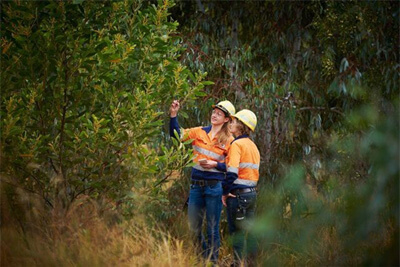
In developing natural resources, companies need to consider environmental impacts in relation to areas such as biodiversity, forests, and water. The local community must also be duly engaged as an important stakeholder. MC ensures that its mining activities in Australia are conducted in harmony with the natural environment and local communities with utmost care and attention, before, during and after the mining operations.

MC established Mitsubishi Development Pty Ltd (MDP), a wholly-owned subsidiary, in Australia in 1968 as a mineral resources investment company. Through MDP, we have undertaken a range of investments in mineral resources operations in Australia. In 2001, MDP created BMA together with global mining giant BHP. By increasing our investment in large-scale metallurgical coal mining operations in Queensland, we took a major step toward becoming a globally significant participant in the metallurgical coal industry.
The metallurgical coal operations of the BHP Mitsubishi Alliance (BMA) are located in Queensland, Australia. BMA produces high-quality metallurgical coal used for steelmaking. BMAʼs product is the raw material for producing cokes which, when charged into a blast furnace with iron ore, acts as a reducing agent to produce crude iron. The metallurgical coal produced by BMA is supplied to customers in approximately 30 countries around the world. BMA is the world's largest seaborne supplier of metallurgical coal.

BMA acts as responsible miner and ensures its mine closure plans take into account social expectations and environmental regulatory requirements for rehabilitation. While complying with laws and regulations, BMA strives to minimize its impact on the environment and society by developing appropriate mine closure plans, and by implementing rehabilitation projects based on environmental impact reports and review by field experts and authorities. As part of annual renewal of long-term production plans for each site, BMAʼs planning and investment models are updated including all necessary rehabilitation and closure costs.
The majority of BMA’s coal operations are open-cut mines, a method requiring overburden removal to depths up to 200+ meters in order to expose the underlying coal seams.
The mining process at an open-cut mines start with removal and stockpiling of the topsoil. The area where BMA mines are situated is not heavily forested as it has a dry tropical climate. The topsoil of about 30-40cm depth is removed and preserved in stockpiles and covered with a mixture of grass and scrub to preserve it for later use in rehabilitation. After this process is complete, overburden removal and subsequent coal mining are carried out, leaving behind a large pit. Once the coal has been mined, the overburden that was moved and placed in spoil dumps during mining operations is profiled. The profiled dump surface is then covered with topsoil mixed with rock mulch and planted with seeds of indigenous grasses, trees and shrubs.
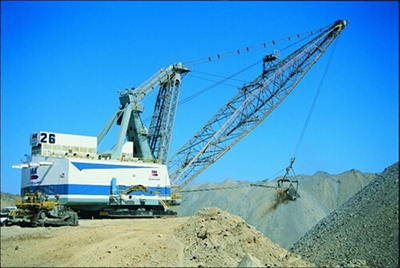
After rehabilitation works have been completed, site recovery is monitored to confirm whether the final landforms are stable, water runoff is of acceptable quality and vegetation is taking root. BMA employs ecological specialists for the planning, rehabilitation, and surveying stages to supervise the rehabilitation process.
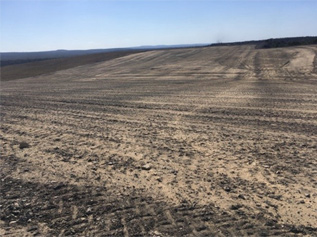
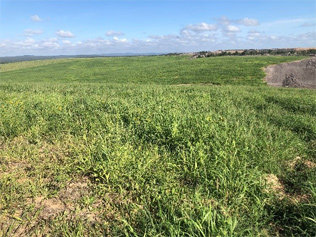
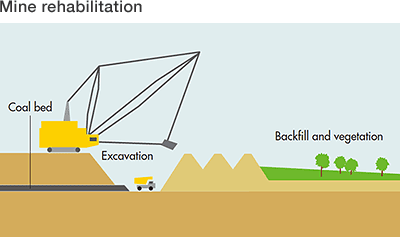


©Conservation International/Tessa Mildenhall
Agrex do Brasil, an MC subsidiary, is a Round Table on Responsible Soy Association (RTRS) certified producer with a total of approximately 19,000 hectares of land certified under this standard. Agrex do Brasil was the first company in Brazil to obtain RTRS certification for the production of responsible soy in its farmland in Maranhão, Brazil. Through the RTRS certification, Agrex do Brasil seeks to make various internal improvements, increase efficiency in soil management and protection, improve water management, foster employee motivation and strengthen relationships with neighboring communities.
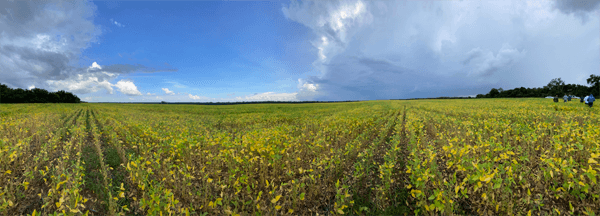
Agrex do Brasil is operating in compliance with Brazil’s soy moratorium (Moratória da Soja), a voluntary industry agreement that prevents participating companies from buying or selling soybeans grown in areas of the Brazilian Amazon that have been deforested since July 2008. Compliance with the moratorium is monitored through annual audits conducted by an independent organization selected by a working group made up of industry associations, including the Brazilian Association of Vegetable Oil Industries (ABIOVE) and the National Grain Exporters Association (ANEC), as well as representatives of civil society.
MC actively discloses information related to its efforts regarding ESG to a variety of stakeholders around the world. FY2014, MC has responded to CDP Forests, a survey which evaluates companies’ forest management in the supply chain. CDP is a UK-based international environmental NGO, and conducts activities to promote corporate disclosure of environmental information at the request of institutional investors around the world. It holds the world’s largest database of corporate disclosures on climate change initiatives.
Cermaq, an MC subsidiary, has identified biodiversity protection as a key part of its license to operate in all the countries where it has operations. Cermaq works actively in cooperation with local stakeholders to protect biodiversity, including salmonids in all areas where they are present, monitoring of benthic impacts and tracking bird and marine mammal mortalities at its sites in compliance with all laws and regulations of Chile, Canada, and Norway and additional requirements set by different certification standards (ASC and BAP).Cermaq also engages in beach cleaning in the regions it operates, irrespective of the source of the litter.
In its feed supplier Code of Conduct, Cermaq mandates that no fish meal or fish oil used in the feed for its fish shall originate from IUU (Illegal, unreported, unregulated) fisheries and that soy shall be deforestation free.

MC is carrying out a forest conservation project in Aki City, Kochi Prefecture, the birthplace of Yataro Iwasaki, the founder of the original Mitsubishi company. MC has entered into a forest conservation agreement with Kochi Prefecture, Aki City, and the Eastern Kochi Forestry Association in an aim to conserve the local environment, and collaborations have been ongoing since 2009. This project was MC's first forest conservation initiative implemented in Japan. It has been named the “Mitsubishi Corporation Thousand Year Forest” (also known as “Yataro’s Forest”) and consists of a 263-hectare expanse of forest, 143 hectares of which are owned by MC. Aside from conducting forest conservation activities to improve functions that serve the public interest, such as headwater conservation, the area is also used as a place for MC employees to participate in volunteer activities as well as for environmental education.

In March 2020, MC entered into an agreement with the Shikoku Forestry Bureau, Aki City and the Eastern Kochi Forestry Association to introduce management policies in the Becchaku area of Yataro's Forest based on the Shikoku Forestry Bureau's policy of establishing what it refers to as "green corridors," *1Under a protective forest system, Shikoku’s national forests have been protecting important plants, animals and the forest area. This system is expected to help conserve biodiversity by establishing “green corridors” that connect these protective forests, allowing plants and animals to spread and to come and go freely between them.*1 in an effort to conserve biodiversity.
As a result of these conservation activities, a section of Yataro's Forest *2Out of the 263 hectare area of the Thousand Year Forest, 212 hectares fall under the area that has been classed as a Nationally Certified Sustainably Managed Natural Site, jointly certified by MC and Aki City, which connects to a "green corridor in the Shikoku Mountains District".*2 was certified as a Nationally Certified Sustainably Managed Natural Site *3Nationally Certified Sustainably Managed Natural Sites are areas where biodiversity conservation is being promoted through the support of private-sector initiatives.*3 by the Ministry of the Environment in March 2024.
Since fiscal year 2005, MC has engaged in the Global Coral Reef Conservation Project, a project that is actively researching the causes and effects of the coral reef crisis. This project aims to help conserve coral reefs around the world through a research-based approach. Research is being conducted in cooperation with universities, NGOs and other organizations. As part of the project, MC also recruits volunteers from inside and outside the Company, in a program designed to deepen people's understanding of environmental issues.

MC started supporting Natural Climate Solutions (NCS) in 2022 as part of its philanthropic activities. There are various methods for NCS, but MC focuses on methods of preventing degradation in rangelands with the goal of preserving the amount of CO2 absorbed by plants, and to prevent CO2 stored in soil and vegetation from being released into the atmosphere.
Population is rapidly growing in near Durban South Africa. Due to the increase in grazing caused by an increase in population, the number of rangeland which consist by grass and shrubs has begun to decrease and there are concerns of the amount of CO2 absorbed may decrease and that the CO2 stored in soil will be released.
In this project, MC will work together with Conservation International, an environmental NGO, to conserve rangeland in cooperation with local communities. At the same time, it aims to improve the living standards of local residents by improving the quality of livestock farming and conserving water resources. In the future, MC aims to contribute to climate change, to support local communities and to the conservation of biodiversity through participating in various NCS projects.

Through the Mitsubishi Corporation Foundation for the Americas (MCFA) and the Mitsubishi Corporation Foundation for EMEA, which aim to tackle societal issues across the Americas, as well as both environmental protection and societal issues across Europe, the Middle East, and Africa respectively, MC is involved in activities that support environmental conservation, educational research on the environment and efforts to address the issue of poverty. The MCFEA and the MCF for EMEA is providing support through a wide range of partner organizations, including Farm Africa, which supports sustainable coffee farming in Bale-Eco region, Ethiopia, and the Yellowstone to Yukon Conservation Initiative, which is working to protect caribou in Canada.
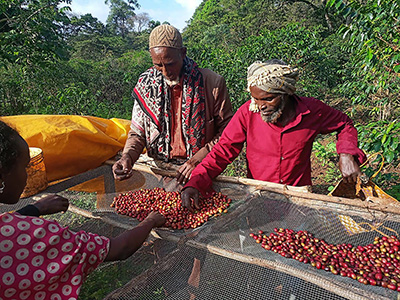
In April 2015, MC joined the Japan Business Initiative for Biodiversity (JBIB)*A group of Japanese companies engaged in biodiversity protection activities*,a group of firms committed to undertake joint research aimed at protecting biodiversity. The JBIB member firms agree to respect biodiversity in their daily business operations and pursue activities aimed at minimizing negative biodiversity impacts. Going forward, through communication with JBIB members and related initiatives, we will work to find ways of enhancing our initiatives toward protecting biodiversity.